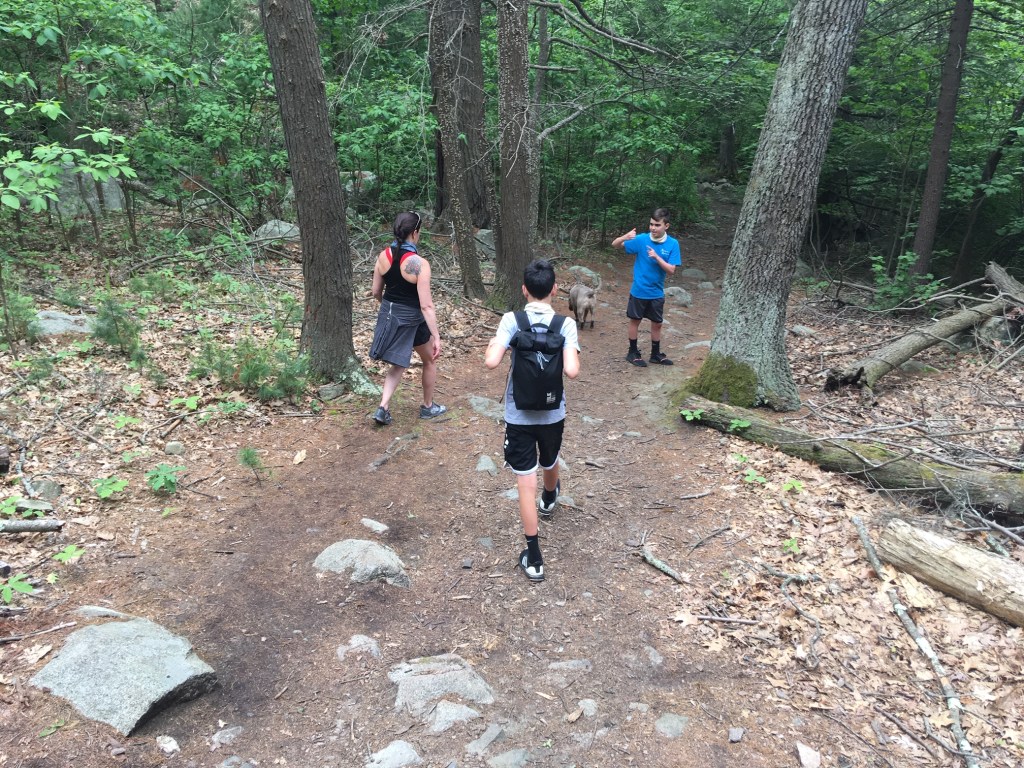Characters: A typical family (mine) – Youngest Son – 13 years-old, Oldest Son – 15 years-old, Mom – none of your business, Dad – 48 years-old, The Dog
Scene: Sunday morning (perhaps a holiday like Mother’s or Father’s Day), the family, by edict of the parents, gets up “at a reasonable hour,” drives to a trailhead and recreates “in nature.”
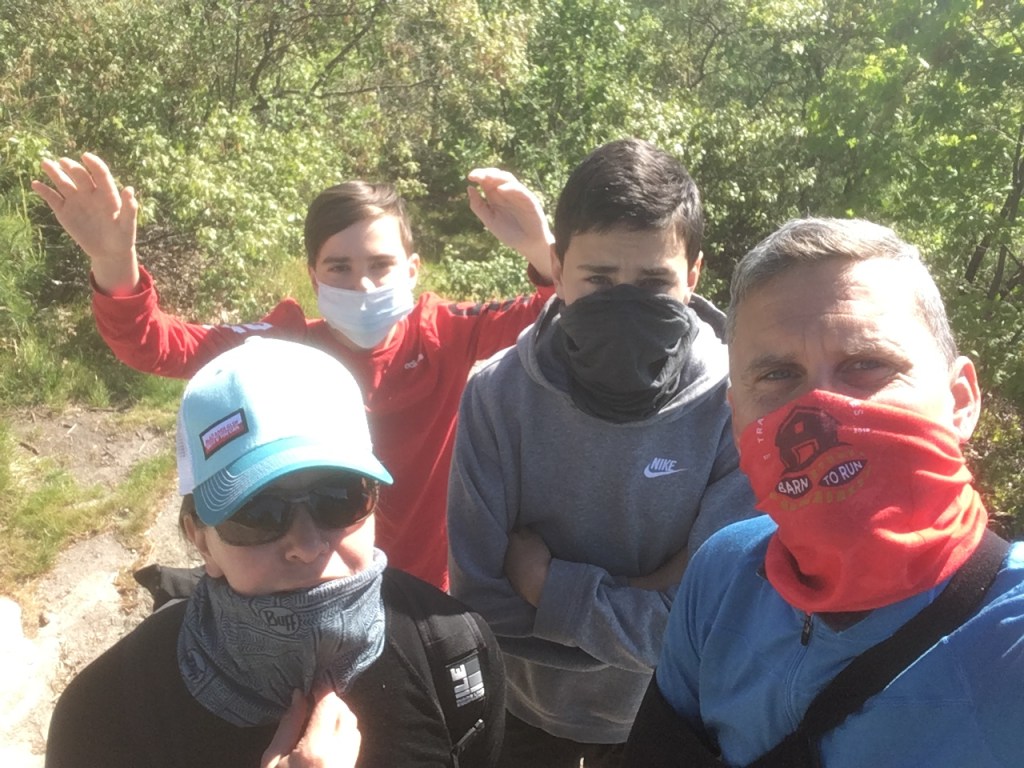
Background: Youngest son is ok, even good, one-one-one. He will stop to look at birds pointed out to him by Dad. He will listen as Dad talks about trees. He will nod non-committaly when Dad suggests a mountain biking trip. Youngest son retains the softest sheen of innocence still. He is, by and large, intransigent, unwilling, disinterested, apathetic, but one-on-one he’s still worth walking in the woods with, even if he barely bothers to hide his interest in it being over as soon as possible.
Once oldest son is involved, all bets are off.
Oldest son makes an art of opposition to family plans. He is not confrontational or difficult. He employs humor and even courtesy in demurring at any invitation, any mere suggestion that he attend the woods with his parents, singly or together. He is good-natured, but he remains deeply resistant. For example, any mention of birds receives a lampooning in return. “I’m pretty sure that’s the Black Winged Tree Bird, Dad,” he might say. When some rare species is pointed out, he declines even to look in its direction. He wants no turns with the binoculars.
When oldest and youngest son are together in the woods, they drift off the back, no matter the pace, discussing whatever anime they’ve both been watching, alone in their separate rooms. Both grow more attitudinal by an order of magnitude when they are together.
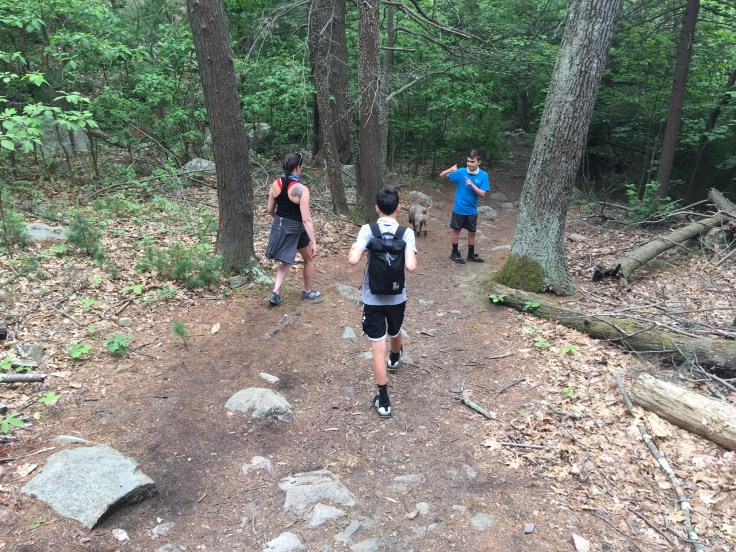
Mom just wants everyone to participate cheerfully. Poor woman. Just a peaceful walk in the woods with her family. Mom has likely taken the time to put together snack bags, no matter how short the hike. She has water. She has bug spray. In fact, she has a whole backpack full of things, “in case.”
Dad (me) is the real problem.
Dad only really wants to take on expeditions. He’s not much for short hikes. If he’s not sweating and hasn’t covered some vaguely obscene amount of ground, he’d just as soon go off on his own to commune with the birds and the trees. He’s pretty insufferable, but he’s a willing participant. In moments of clarity, he will even tell you that time in the woods with his family is his favorite thing, although that judgement is based on an idealized fantasy of family outings. Dad fails to truck much with reality. He also walks too fast and is seldom prepared for “in case.”
The Dog is the best of us. Other than having to bag his shits and carry them around, the dog is pretty close to beyond reproach.
Act I
They (we) leave the house late. The boys cling to the house like a life raft after a plane crash in the ocean. The house contains all the food they like, all the electronics, soft places to sit. Home is compelling, but the boys first contribution to the event is to irritate their parents by not being ready at the previously announced and agreed hour.
In the car on the way, Dad tries to ignore the fact that youngest son is watching anime on his phone with the volume at barely-audible. Dad is already disappointed that youngest son can’t go 10 minutes without being entertained digitally. Youngest son is already irritated with Dad for ruining his weekend, and possibly his life.
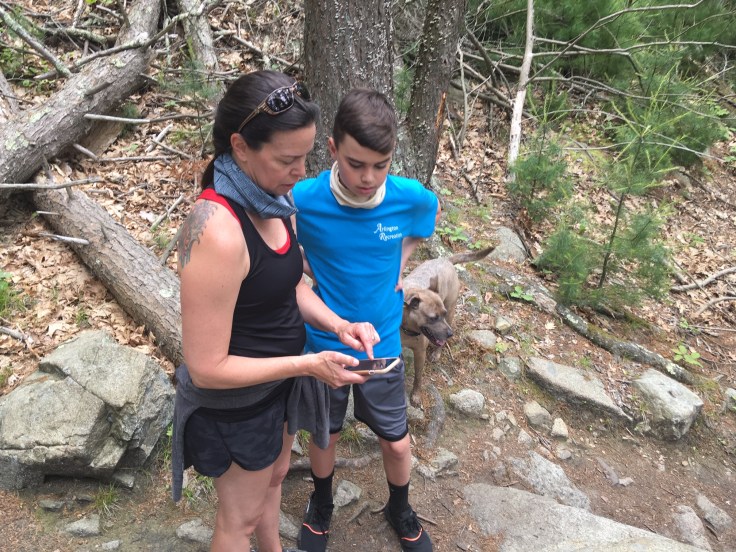
As some sort of gesture, Mom puts on the radio and tunes to very worst station Dad has ever heard in his life. Dad groans audibly. Oldest son says, “I like this song. It slaps.” Mom doesn’t know what that means, but the music drowns out the anime sounds from youngest son’s phone. Dad makes the first mental promise to himself that he won’t flip out on the kids. Youngest son says, “How long until we’re there?”
With Dad navigating for Mom, GPS app announcing each turn AND displaying a map, they drive by the trailhead three times before figuring out that the sandy patch after the NO PARKING sign is where they need to be. Yes. Now they see it. There’s a trail sign. It’s actually quite large.
Act II
Dad pops out of the car, ready to rock. No one else moves. The kids behave as though they are unaware that the car has stopped. Mom begins to gather equipment, the bag, a hair tie, a hat. She stows her phone in one pocket, then another. Finally she says to the kids, “Guys, wake up. Let’s go!” Five minutes later, they are all standing at the trailhead.
Dad makes the second mental promise to himself that he won’t say anything, that he’ll be patient, kind, and nurturing. He feels a tightness in his chest and a pressure behind his eyes. He tastes gun powder. He smells his life ebbing away in great gusts of childish indifference.
The boys have worn the wrong shoes, and those shoes aren’t tied. Mom points this out. She also mentions that normally people pick their feet up when they walk. They don’t shuffle through the rocks and dirt. This observation has no discernable effect on the kids.
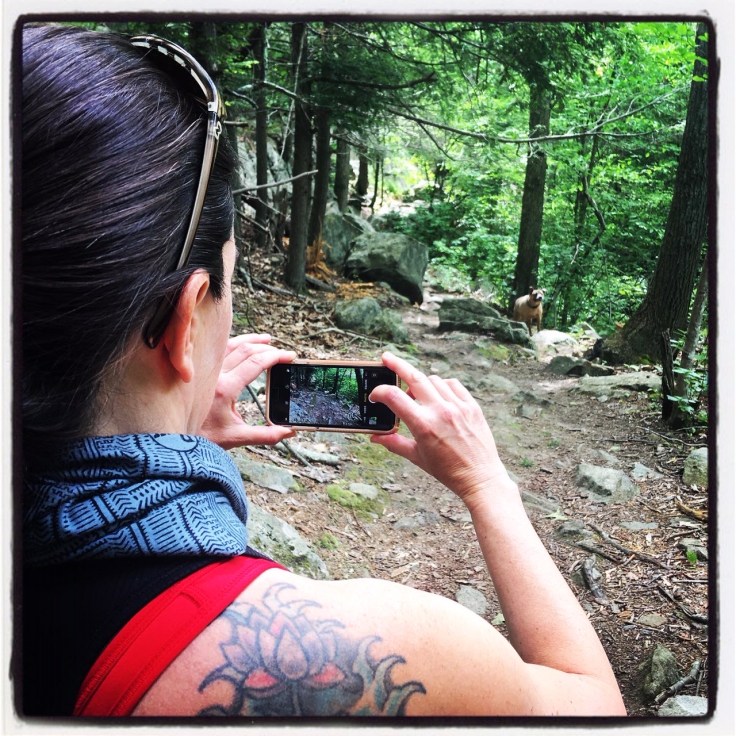
Dad has walked off up the trail somewhere. Mom thinks, “What if something happened to us back here? Would he even notice?” This particular thought is not without merit, Dad having even recently left Mom, injured after a fall, back up the trail to drag herself to her feet, brush the dirt out of her hair and try to catch up. Dad is not the most helpful.
Up there in his own world, he’s trying to create a mental map of the place, noticing trail crossings and downed trees, keeping track of the general direction of the car. He knows “getting back to the car” will eventually become the whole family’s defining purpose. He does, intermittently, notice that he’s left them all behind, periodically stopping to wait while also promising for a third and fourth time that he’ll keep his shit together.
Act III
Dad and Mom both spend time debating internally the merits of even bringing the boys along on these adventures. Sure, they both believe the woods are the best place in the world, and they’re both desperate for their kids to see the beauty and feel the peace of the natural world, but the results are always disappointing. The boys refuse, maybe on principle, to turn the corner, to become outdoorsy. Is this an exercise in futility, or an investment in a future of shared good times in the wild?
Can the answer be, yes?
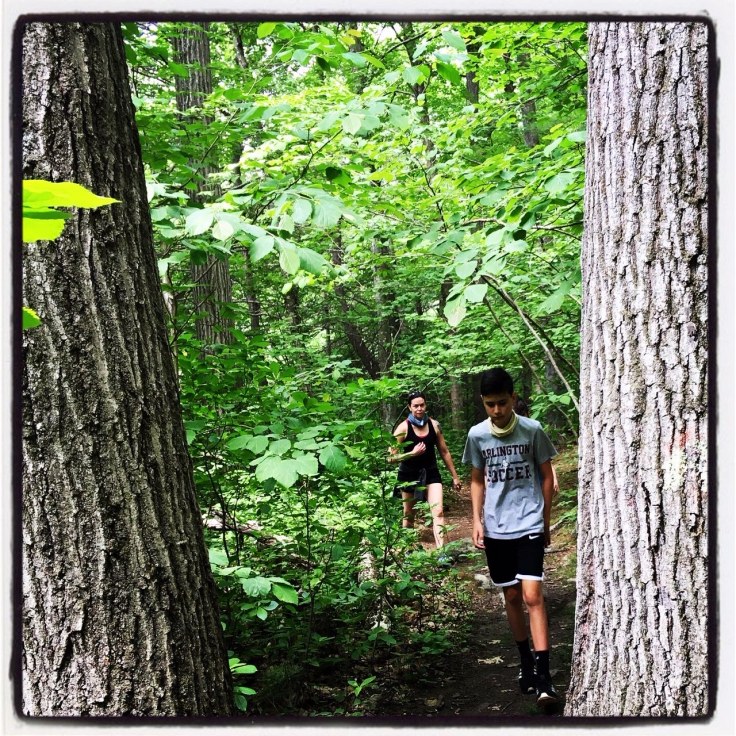
Now the snacks and water are out. They have traveled, by Dad’s rough estimation, about a mile. A fifth promise rises in Dad’s mind. Mom, the more patient one, understands the kids need diversion in order to keep moving forward. Oldest son picks all the chocolate chips out of the family bag of granola. Youngest son yells, “Cut it out, you asshole!” But it’s too late, and oldest son is only amused anyway.
Dad refuses to eat granola. He thinks this somehow makes him better. It doesn’t. And it never will.
Act IV
Now they’re moving again, but it’s not long before youngest son is asking how far it is back to the car. This catches Dad in two minds. On the one hand, he’s irritated that two-and-a-half miles constitutes a family hike with his children. On the other hand, the sooner this is over, the sooner he can disengage from his frankly unhelpful attitude about the weakness of his kids’ generation. What starts out as a low level rage about their inability to do even the easiest physical tasks boomerangs back into feelings of inadequacy as a father. “My kids lack grit, because I’ve failed to give it to them,” he thinks.
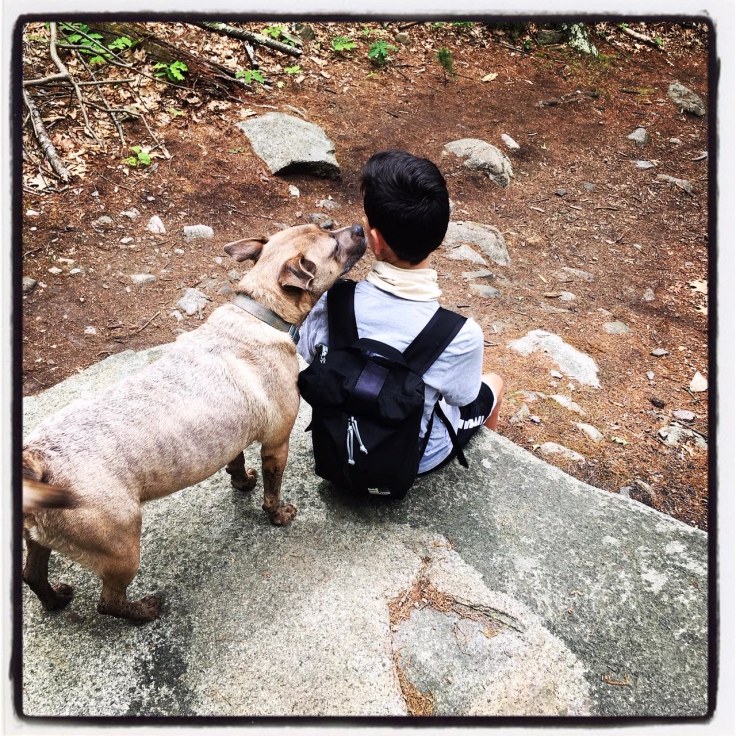
Mom has now conceded that it’s best to wrap this thing up. She and Dad disagree about the way back. Dad is always playing navigational hunches, and the woods seldom reward him with straight shots back to the parking spot. They take 40 more minutes to cover the half mile back, but only double back on themselves twice. So that’s a win. In his book.
Epilogue
The kids are relieved. Soon they’ll be back on Xbox, their friends in the headphones, the cool, dampness of the basement a welcome respite from the buggy woods and the radiating disappointment of their parents.
Mom and Dad engage in a small bit of revisionist history on the way home. “That wasn’t too bad,” she says. Dad adds, “No. We could do that again.”
